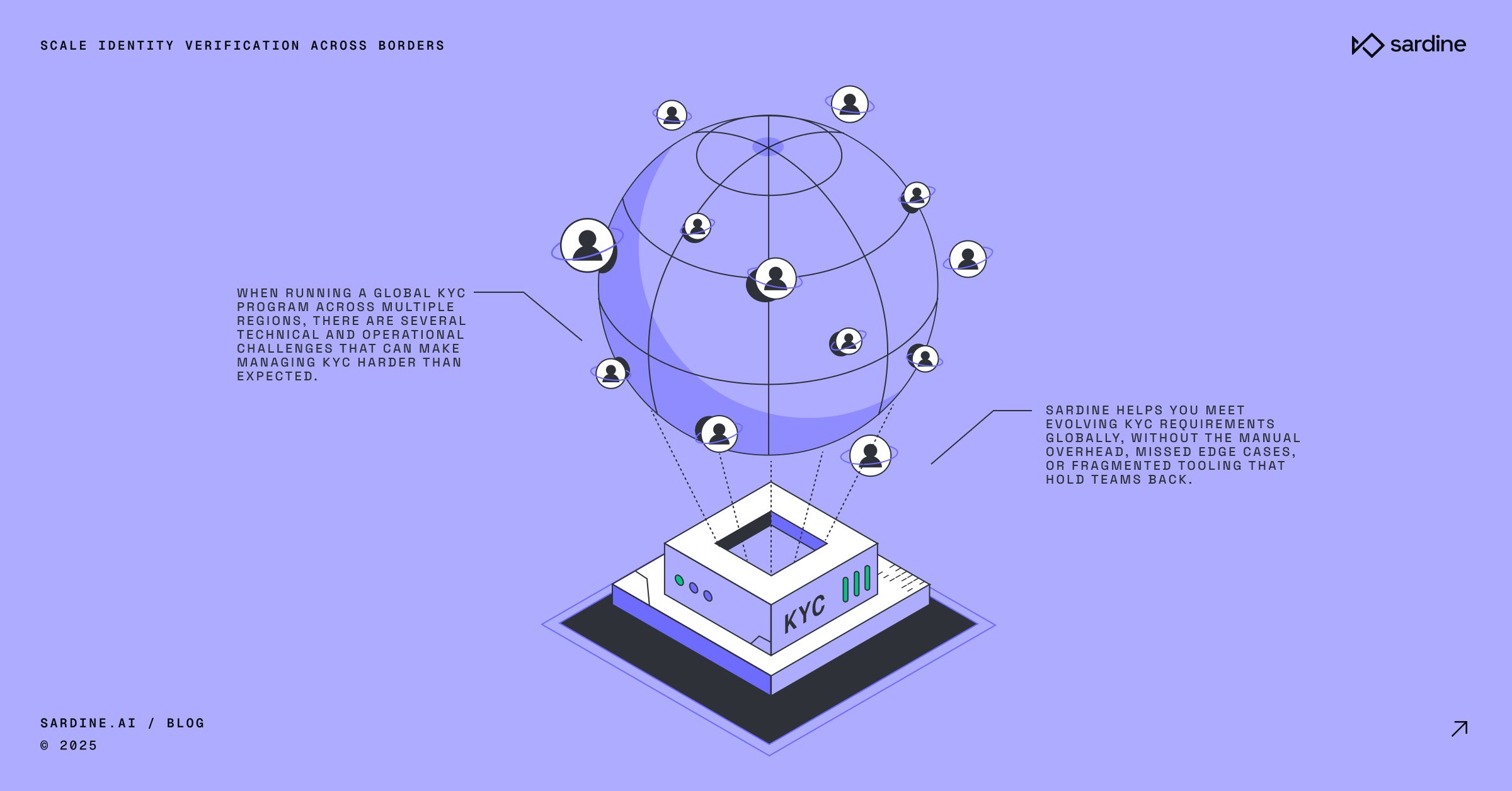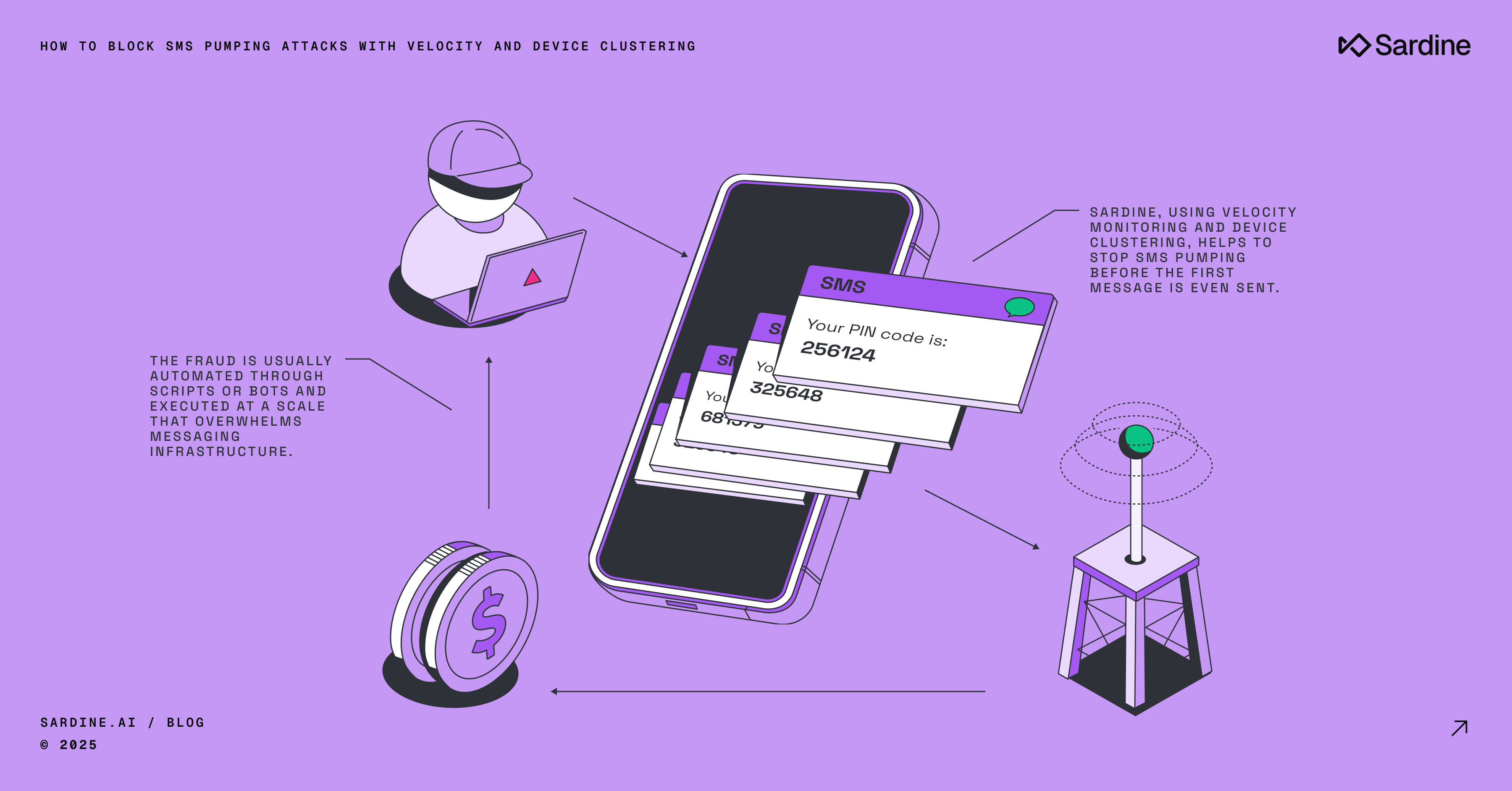Managing Global KYC Requirements at scale
Every country handles KYC differently.
They have their own rules, accepted documents, and standards for what qualifies as verified identity. That creates real complexity for compliance teams trying to scale onboarding globally.
Many companies rely on document uploads to meet these requirements. But that approach adds friction for users and leads to high failure rates. Legitimate customers can also end up in manual review queues, not because they’re risky, but because the system wasn’t built to handle their documents or regional norms.
To address this, many teams are combining eKYC with device and behavior signals to strengthen identity verification, and layering AI agents on top to streamline reviews and reduce false positives.
In this post, we’ll break down the main challenges with global KYC and share how Sardine supports compliance teams working to simplify onboarding across multiple jurisdictions.
What’s the difference between eKYC and traditional KYC verification?
Traditional KYC relies on manual document uploads. Customers are typically asked to submit photos of their ID, a selfie, and occasionally a utility bill. These documents are reviewed manually or parsed with basic template matching, which creates latency and inconsistency, especially across diverse formats and languages.
eKYC verifies identity digitally and in real-time. It uses live data sources, biometric checks, and structured parsing to confirm user identity with high accuracy and lower friction. Because eKYC workflows can be configured to reflect each country’s rules, they help compliance teams improve user experience while maintaining full regulatory coverage.
KYC by country: How requirements differ
Every country takes a different approach to KYC. Most follow guidance from the Financial Action Task Force (FATF), but how those recommendations are implemented varies widely.
Some regulators require face-matching and liveness checks. Others accept document uploads or database lookups. In certain markets, businesses must store identity data locally or get explicit consent for each verification step. There are also differences in which types of companies are subject to KYC obligations, and what kinds of identity documents are considered valid.
For example, Germany requires a live video interview as part of identity verification. Brazil mandates CPF validation against federal databases. India uses Aadhaar for eKYC, while the UK often includes proof of address as part of the onboarding flow. These details vary not only by country, but sometimes by entity type and product category.
These differences matter when you're scaling. Even small deviations, like a mismatched document format or unsupported ID types, can lead to onboarding failures, audit issues, or compliance gaps if the flow doesn’t reflect local rules.
Common challenges with global KYC programs
When you're running a global KYC program across multiple regions, there are several technical and operational challenges that can make managing KYC harder than expected.
False positives that add unnecessary review volume
Name formatting, transliteration issues, and inconsistent ID layouts frequently cause legitimate users to fail verification. This is especially common with non-Latin scripts or documents that don’t match system templates. The result is a growing queue of manual reviews for users who shouldn’t have been flagged in the first place.
Manual review that doesn’t scale
As new markets come online, your review queues grow quickly. Many cases are low-risk but still require human intervention due to poor template support or unclear error handling. This adds latency and burden to your ops teams, especially when case volume spikes.
Vendor sprawl creates visibility gaps
It’s common to rely on multiple KYC vendors to get full geographic coverage. But each provider defines "verified" differently, returns different fields, and lacks a shared data model. Without normalized outputs, it's difficult to apply consistent policies, audit outcomes, or assess program performance across regions. Vendor management can also add unnecessary complexity, as you have to manage multiple contracts, integrations, and dashboards.
Lack of clarity on verification failures
When an ID fails, you need to know why. But not every system returns detailed failure reasons. Some provide only high-level status codes, which makes it harder to distinguish between real fraud and formatting issues. This slows down your ability to tune policies or explain decisions during audits.
Slow rollout of regulatory changes
New KYC rules and document types are introduced regularly. But updating your onboarding flows, rulesets, and vendor configurations takes time. Without a flexible system in place, these changes can lag, creating gaps in your compliance posture if not addressed quickly.
How Sardine helps compliance teams with global KYC
Sardine is designed to help compliance teams manage onboarding across multiple regions without increasing operational complexity or introducing blind spots. Here’s how:
Broad identity verification and data coverage
Sardine delivers unmatched electronic Know Your Customer (KYC) services in 45 countries and provides real-time document verification in nearly 200 countries. Using data from over 150 trusted sources, we can ensure the highest level of accuracy in identity validation.
We efficiently handle 4,900 distinct identity documents, including government-issued IDs, passports, national IDs, and driver's licenses. Our verification results are consistently delivered in under 2 seconds.
Device and behavior signals to strengthen identity checks
We go beyond document verification to detect deepfakes, obfuscation tools, and suspicious behavioral patterns. Signals like hesitation when entering personal data or device links to multiple identities can indicate elevated risk before fraud occurs.
Configure and maintain rules without engineering support
Our no-code rule builder makes it easy to edit KYC policies across countries, product lines, or customer segments without relying on engineering. You can safely test changes using shadow mode or backtest them against historical data before going live. We also offer detailed rule analytics on how each rule performs, so you can tune policies confidently and maintain full audit readiness.
Tailor onboarding flows to local regulations and user risk
We offer a no-code workflow builder that lets compliance teams define KYC steps by country, product, or customer profile. You can automate risk decisioning, route cases for manual review, and trigger step-up verification only when risk thresholds are met.
Resolve cases faster with AI-powered review automation
Our onboarding AI agents help your team automatically resolve low-risk alerts, using the same policy logic and thresholds you define. You stay in control with built-in guardrails and fallback paths to ensure that edge cases or higher-risk scenarios are escalated for manual review. In production, these agents have resolved over 97% of false positives and helped teams cut review times from 14 hours to under an hour, while meeting compliance standards at every step.

Compliance leaders shouldn’t have to choose between strong regulatory coverage and a smooth user experience. Sardine helps you meet evolving KYC requirements globally, without the manual overhead, missed edge cases, or fragmented tooling that hold teams back.
Contact Sardine if you’d like to explore ways to improve your global KYC program.








